“Injustice anywhere is a threat to justice everywhere.” — Martin Luther King
Dear Board members at MAMI,
My name is Shazia Iqbal. I am the writer-director of a short film titled ‘Bebaak’. Our film was supposed to have its world premiere at the Mumbai Film Festival, this year. It is not going to anymore. The leadership at MAMI decided to drop the film.
Why? That is the answer you owe my team and me.
I was not given an official written statement from the board/committee members as to why my film was dropped. This, inspite of me repeatedly asking for the same:


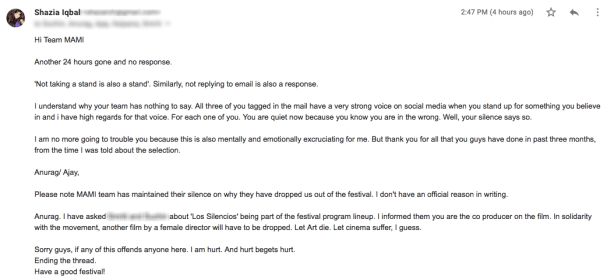
A few more attempts on Whatsapp went unanswered. But this is what I did get:
I was then told by a member that this decision wasn’t fair to me but it was the final decision of the board. And that it was not meant to be a punishment or judgement.
I appreciate the empathy from Team MAMI but it changes nothing.
These are the questions I want to ask:
Then why was the film dropped? If it doesn’t serve as punishment or judgement?
Did you know the content of the film before dropping it? Or were we part of a surface clean-up?
I understand there are ‘collateral damages’ in a battle but my film is as feminist as this battle we are fighting; and if you’re shutting down a film that starts a conversation against misogyny and patriarchy, then what side of the battle are you on?
What side of the movement do you all belong to?
In any fight, you have to keep in mind the words ‘Justice’ and ‘Punishment’.
Justice: being fair and reasonable, treating people equally.
Punishment: the infliction or imposition of a penalty as retribution for an offence.
I was told over a phone call that my film ‘Bebaak’ will be dropped from the festival program because one of the producers is Anurag Kashyap.
I was not told, but was supposed to understand, that since he is accused of “being complicit” in a sexual harassment case (one of the partners at Phantom, Vikas Bahl is accused of sexually assaulting a woman), our film has been disqualified.
Let me clarify that Anurag is one of my two producers. The other is Ajay Rai of Jar Pictures. And the film is independently produced by both.
Phantom Films (of which the directly accused, Vikas Bahl was part of) has nothing to do with us. There was no monetary or production involvement with the accused in any capacity.
This is an open legal case and I will say as much there already is in public domain (and also include some of my personal knowledge) that Anurag did all that he could at the time and unfortunately, yet it wasn’t enough to get the woman complete justice because she did not want to make a formal complaint. (Sorry, I don’t use the politically correct but demoralizing word ‘victim’.)
Anurag was a Board Member of your Academy.
He voluntarily stepped down from the Board to keep your reputation ‘clean’. Here is his tweet (where he also denies being complicit):
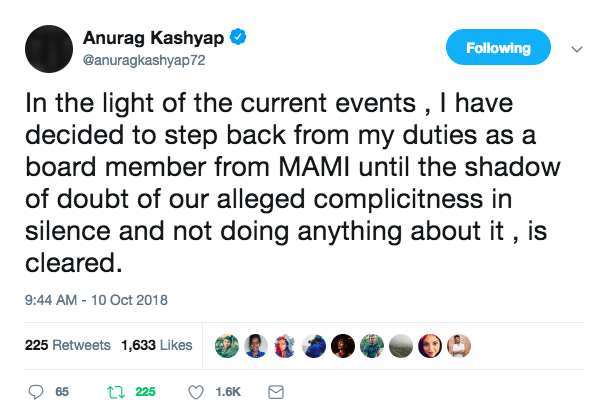
Here is another tweet where he denies being silent:
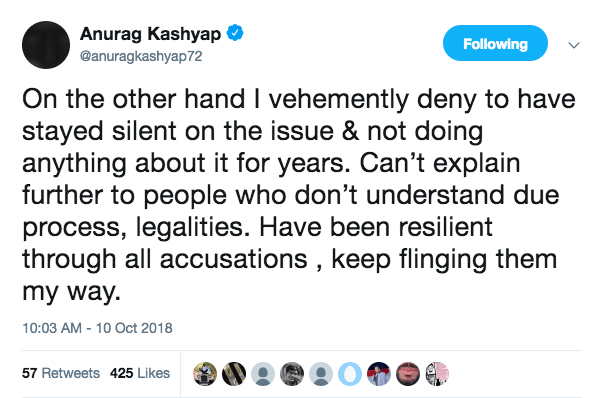
Here he mentions his responsibility to the women with whom he works with (I am one of them) and mentions that we have questioned them regarding the case (him and Vikram):
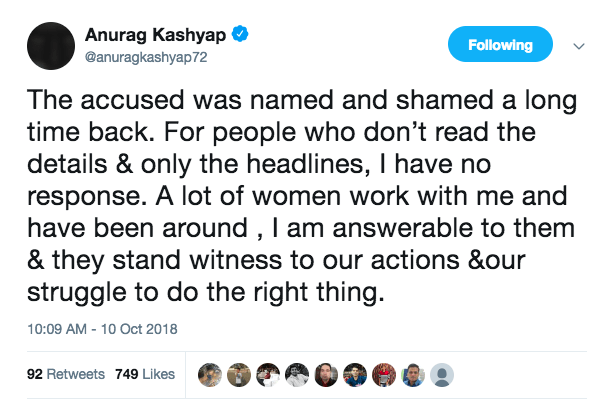
Anurag and Vikram clarified their side of the story, shared their dilemma and apologised.
But apparently none of this mattered.
You chose to believe a one-sided, article written by a so called ‘investigative journalist’ — Ankur Pathak — who kept many details out of the article because it did not suit the narrative of a story he wanted to tell; painting Anurag and Vikram as the wrongdoers, way more than the accused, Vikas Bahl himself!
And instead of standing up for the truth or even looking for it, you would rather go with the lynch mob mentality and a knee jerk reaction than look for a more nuanced solution to the situation.
I am the writer-director of the film. I have a female lead, and more than fifty percent of my main cast and crew are women. We have all become the “collateral damage” of a movement that is meant to empower women. I don’t fully understand law but I understand enough about equality and just treatment. You’re questioning the integrity of two men who are currently defending a woman in court/fighting an accused sexual predator and you’re taking action against them (and my team) based on an article.
Ankur Pathak is NOT the court of law. Isn’t this also a form of harassment?
Anurag and Vikram have apologized for not taking a harder stand, but at no point did they accept being complicit. I have been working with Phantom Films as a Production Designer (since early 2017), and I have never once seen Vikas Bahl, the accused in the company premises or on shoots.
In some personal conversations, Anurag spoke about Vikas and expressed his disgust with the man, said he wanted to take action against the man. I know of Shubhra (his girlfriend) being adamant about the same. He didn’t want his name on Mukkabaaz and later in other films but was bound by the contract. I am a witness to Anurag’s struggle, but since I am an ally, my testimony here doesn’t matter.
After the shoddy Huffpost article was published, Vikram stood amongst all the employees at Phantom Films and asked us to raise any doubts we had about the case. Without any hesitation, I and other women (and men) threw several questions at him regarding the case and each of those questions were answered. Convincingly.
Today he too stands punished. A film produced by him, directed by Atul Mongia has also been removed from your anthology slate. So now any film can be rejected or dropped on the basis of past association, whether the accused is involved or not?
Today Anurag and Vikram are being punished. As is everyone associated with them. Including their films; our films. Meanwhile, Vikas Bahl has slapped a defamation case against them.
Please don’t misconstrue this as personal agenda in support of friends/employers. I am merely stating the facts.
In the meantime, the rest of us have to suffer the wrath against one man. This is where I’m lost. Let’s look at this more objectively.
MAMI is a prestigious film festival. It is run and backed by some of the most powerful people in the industry. My film ‘Bebaak’ is just another short film. What we share in common is that we were both backed by Anurag Kashyap.
You asked me to drop Anurag’s name (because he insisted that ‘Films are bigger than individuals), I agreed. A feminist film getting a platform in the midst of the country’s biggest Me Too wave is a great deal; I revised my DCP, Trailer and Poster and had his name removed. (Poster attached)
 Similarly, MAMI was also supported by Anurag as a Board member. He voluntarily stepped down. So now the short film is sans Anurag’s name and MAMI, the big film festival, doesn’t carry his name either. To apply your very fair analogy, if you still decided to drop my short film for my association with Anurag… shouldn’t you also dissolve the board itself for your association with Anurag?
Similarly, MAMI was also supported by Anurag as a Board member. He voluntarily stepped down. So now the short film is sans Anurag’s name and MAMI, the big film festival, doesn’t carry his name either. To apply your very fair analogy, if you still decided to drop my short film for my association with Anurag… shouldn’t you also dissolve the board itself for your association with Anurag?
Why don’t YOU take that moral responsibility and shut yourself down for previously being associated with those who YOU believe have been complicit?
Have you also done a check on your other Board members? Made sure they are not in association with any accused? Or not complicit?
Because as I see, there are at least two MAMI Board members who were in the know-how of an actress being harassed during audition by a director (already accused publicly). I was personally told by this actress that your Board members did nothing despite being from a big film family. (You can keep an independent inquiry panel and I will testify and name the board members. I assure you I would not have galls to say this if it wasn’t the truth.)
So does MAMI agree to dissolve its board to stand in solidarity with the movement since their own board members are complicit? Or is this only applicable to filmmakers?
Now let me explain the hypocrisy. These are the films MAMI has dropped:
- Satyanshu and Devanshu Singh’s Chintu ka Birthday.
Producer: AIB (Tanmay Bhat accused of not taking action against accused Utsav Chakravorty, Gursimran Khamba accused by an ex-girlfriend of harassment.)
- Rajat Kapoor’s Kadakh. Director himself accused of assaulting a couple of women.
- Kanu Behl’s Binnu ka Sapna. Producer: Chintan Ruparel (of Terribly Tiny Tales, accused of harassing multiple women.)
- Atul Mongia’s Awake. Producer: Vikramaditya Motwane (partner at Phantom, accused of not taking any action against accused Vikas Bahl).
- My film Bebaak. Producer: Anurag Kashyap (partner at Phantom, accused of not taking any action against accused Vikas Bahl).
Each of these films has a different issue, yet every single cast and crew member of the above mentioned films have received the same verdict. Everyone’s film stands cancelled today.
When Hollywood started the Me Too movement and Kevin Spacey was found guilty of assaulting Anthony Rapp, years ago, Netflix replaced him in House of Cards. Only him. Spacey was also replaced in Ridley Scott’s All the money in the world. But the show/film wasn’t cancelled.
Please tell me which Filmmaker/Actor in Hollywood or any other film industry has been punished because they are guilty by association.
But I guess at MAMI, you want to take a very hard stand on this and punish everyone who is in a 100km radius of any accused. This must have required a very strong vetting process, I hoped. But that is not the case.
I am also guessing that the MAMI team aren’t fully aware of these films/incidents mentioned below: (though they are all the over internet and really hard to miss).
- Lars Von Trier’s The House That Jack Built. He is directly accused, not a complicit; one of the most powerful filmmakers to be outed during the Me Too movement last year. Singer-Actor Bjork accused him of sexual assault during filming of ‘Dancer in The Dark’.His partner — Peter Aalbæk Jensen — at his company, Zentropa (producers of The house that Jack built) is also accused of sexual misconduct.How does Lars’ film qualify to play?
- Beatriz Seigner’s Los Silencios. Anurag is credited as one of the producers on the film. Did you guys know? (Well… I did inform your team.)

How is one of Anurag’s films still playing at the festival?
- Paul Schrader’s First Reform. Harvey Weinstein, a predator of the worst kind has been assaulting women for decades. In response, this is what Paul Schrader had to say in a Facebook post:
 Is MAMI comfortable playing a film by a maker who is more offended by the recutting of films, than sexual assault on women?Please remind me if any of my producers made such insensitive, vile statements about treating women as secondary to making films.
Is MAMI comfortable playing a film by a maker who is more offended by the recutting of films, than sexual assault on women?Please remind me if any of my producers made such insensitive, vile statements about treating women as secondary to making films.
Paul Schrader criticised for tone-deaf response to Weinstein allegations
Hollywood writer-director Paul Schrader has been criticised for claiming he is more offended by film producer Harvey…
http://www.independent.co.uk
Also this:
Paul Schrader’s Rape Comments Aren’t Helping Anyone
Obviously there have been a lot of horrible takes on the subjects of consent and sexual assault due to the accusations…
http://www.pajiba.com
- Nagraj Manjule’s An Essay of The Rain: The news came last year that Nagraj Manjule, the director of powerful films like Fandry and Sairat was accused by his wife of assaulting her physically, emotionally, verbally and she also gave details of how he kept her locked in the house while the family went to collect National Award for Manjule.But this qualifies at the festival?
Exclusive: ‘Sairat’ Director’s Ex-Wife Tells Her Story of Abuse
Nagraj Manjule’s Sairat not only gifted its director glowing reviews, but also crowned him as the maker of Marathi…
http://www.thequint.com
- OXFAM.There is a GENDER EQUALITY award by Oxfam at MAMI.Is this the same Oxfam that was embroiled in major sexual misconduct since 2010? This is a huge one to skip.
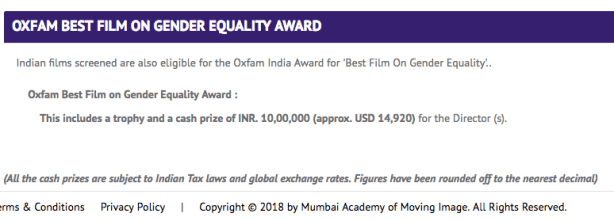
How Oxfam sexual misconduct scandal unfolded
Allegations of sexual misconduct by Oxfam workers in 2011 have rocked the aid sector. Here’s how the scandal unfolded…
news.sky.com
Few things in the world would be as ironical as naming a gender parity award on a company accused of a major sex scandal.
Minnie Driver: Oxfam bosses ‘knew what was going on and did nothing’
Actor and activist who worked with the charity for 20 years stepped down to ‘send a message’ after Haiti sexual…
http://www.theguardian.com
26 new cases of sexual harassment and assault at Oxfam, committee hears
Mark Goldring, chief executive of Oxfam GB, has said that his charity has received 26 new reports of sexual assault and…
http://www.civilsociety.co.uk
Shouldn’t MAMI step down for getting into partnership with a company that has been informed of several sexual assaults but did nothing? Isn’t this a direct association?
(If this is untrue, I will apologise for it.)
And to end with, I also hope you have put the remaining 200 films screening at MAMI through a strict, vetting process. Because as I see and know of the industry, if every film is to be dropped because a cast or crew member is remotely in any association with an accused… no film will play here. I hope no one at MAMI is naïve to believe otherwise.
I say all of this at the risk of damaging my directorial career that hasn’t even started. I challenge you to dive deep into your conflicted conscience.
Because your own integrity stands questioned now.
My film is about a young woman who defies a religious authority when attacked with blatant misogyny. I was told that if the film is screened, its bigger purpose will be lost. I don’t agree. Keeping a gender equality film away from a social and political change makes no sense. It displays a lack of courage.
I am terribly sorry if I sound angry and hurt and broken. I am all of that.
It takes a lot to make even a short film. Writing, Directing, Designing, Casting, Recces, Auditions, Edit sessions, Subtitles, non stop late night Sound and DI sessions, Production. Managing budgets. Accounts. Constantly losing locations. Even a day before the shoot. Reshoots. Press kits. Catalogues. Trailer. Poster.
I kept shuffling between my short film and five Production design projects, last year. Working at an average of 20 hours a day for months.
It took me a year. One whole year! To make a 20 minutes short.
How much time did you guys take to drop the film?
I decided to make a short film because I couldn’t sell my feature film to any Studio. It had a female lead.
‘Female lead and female director is a risk. Aap lead ko change kar ke male kar do‘, said one of the Studio heads (they makes family entertainers).
‘Love the idea. Why don’t you give the script to us? We’ll develop it with another director.‘
So either the director or the lead had to be male.
But that wasn’t the case for a short.
But we were still making a religiously sensitive film in a deeply religious society. We were thrown from locations — Mosques and Tombs — because even when shoots are allowed in sanctimonious environments, Women aren’t.
While dealing with all the humiliation, I held myself and my team together and decided to put it all in my film. Because that’s what story tellers do. We don’t use our physical might, we use our words.
That struggle, that fight was a nightmare. But expected. This struggle, this fight – unexpected.
I thought of MAMI as female-driven connoisseurs of cinema. But for me now, there is no difference between that studio head who thinks women can’t direct, the men who threw us out from the mosque or the members at MAMI Board. Everyone is only concerned with their farce image.
We are a short film. Film festivals are our only hope. We don’t release in theatres.
We don’t have a chance at 40-crores weekends. All we want is to be seen, for our story to reach people.
Do you think my cast and crew of 80 people and I deserve this? As a feminist group, you have shut down a feminist voice even before it took off. This is so heart breaking for my entire team.
But I will not let this be my embarrassment. It is your embarrassment for treating films and filmmakers like disposable trash.
Do you also understand what does your ‘holier than thou’ decision do to us? You don’t think any festivals, will think twice before picking us up? And I know this letter kills our chance further, but I was not taught to be quiet when wronged.
I am a part of MAMI family. For years! I have written articles and reviews on films screened at MAMI. The day I was told our film was selected by MAMI, will remain special for me. Anurag and I were so happy about it. Home premiere! We can show the film to the people closest to us. Our industry friends, our colleagues, families.
Now we have nothing to tell anyone.
From the time the Me Too movement started in the west, I have felt a silent rage and calm within, at the same time. How badly was this needed! And what an artistic way it has come to finally fight the age old patriarchal, dehumanizing idea of treating women as mere sexual objects.
I say artistic because each woman gets a chance to tell her story. Openly. Fearlessly. How powerful is that?
As a survivor of child abuse, several sexual assaults and harassment at workplace, I find it really odd, discomforting, unfair and traumatizing to be at the receiving end of the most powerful feminist moment of our times.
This isn’t justice.
This is irrational, illogical, unjustifiable penance. How is this not harassment?
Sorry MAMI board members, you missed standing by the #MeToo movement by a mile.
I wait for a response.
Sincerely,
Shazia Iqbal (@shazarch)
On Medium

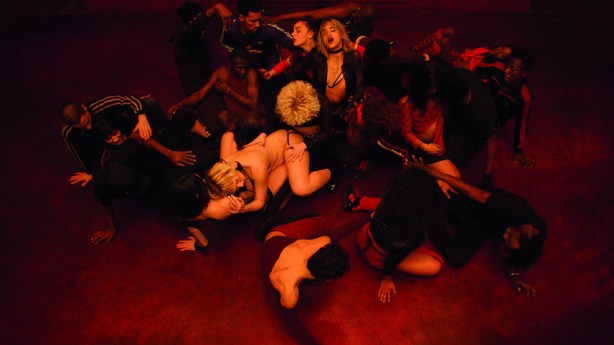
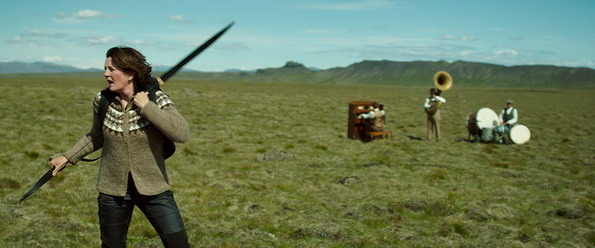














 Similarly, MAMI was also supported by Anurag as a Board member. He voluntarily stepped down. So now the short film is sans Anurag’s name and MAMI, the big film festival, doesn’t carry his name either. To apply your very fair analogy, if you still decided to drop my short film for my association with Anurag… shouldn’t you also dissolve the board itself for your association with Anurag?
Similarly, MAMI was also supported by Anurag as a Board member. He voluntarily stepped down. So now the short film is sans Anurag’s name and MAMI, the big film festival, doesn’t carry his name either. To apply your very fair analogy, if you still decided to drop my short film for my association with Anurag… shouldn’t you also dissolve the board itself for your association with Anurag?
 Is MAMI comfortable playing a film by a maker who is more offended by the recutting of films, than sexual assault on women?Please remind me if any of my producers made such insensitive, vile statements about treating women as secondary to making films.
Is MAMI comfortable playing a film by a maker who is more offended by the recutting of films, than sexual assault on women?Please remind me if any of my producers made such insensitive, vile statements about treating women as secondary to making films.
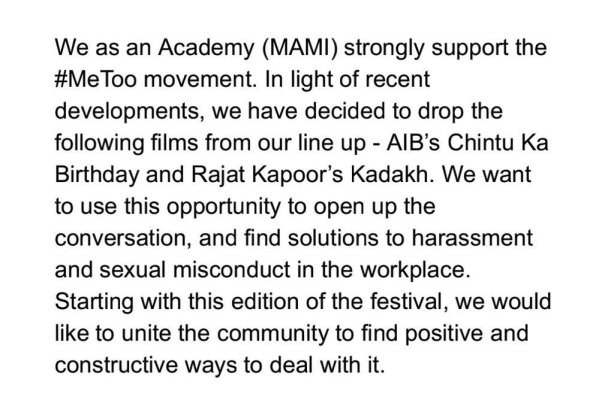


 Having made an indelible impact on Indian cinema with her work in front of the camera, renowned actor Konkona Sensharma (Talvar) makes her debut as a writer-director with this tense family drama.
Having made an indelible impact on Indian cinema with her work in front of the camera, renowned actor Konkona Sensharma (Talvar) makes her debut as a writer-director with this tense family drama.